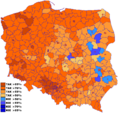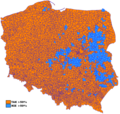7–8 June 2003 | ||||||||||||||||||||||
Do you approve of the Republic of Poland's accession to the European Union? | ||||||||||||||||||||||
 Ballot paper used in the referendum | ||||||||||||||||||||||
| Outcome | The referendum passed, and Poland joined the EU the following year. | |||||||||||||||||||||
|---|---|---|---|---|---|---|---|---|---|---|---|---|---|---|---|---|---|---|---|---|---|---|
| Results | ||||||||||||||||||||||
| ||||||||||||||||||||||
 Strength of the yes vote by voivodeship | ||||||||||||||||||||||
 Strength of the yes vote by voters abroad | ||||||||||||||||||||||

A referendum on joining the European Union was held in Poland on 7 and 8 June 2003. [1] The proposal was approved by 77% of voters. Poland subsequently joined the European Union that year following the ratification of the Treaty of Accession 2003. The country's first European Parliament elections were held in 2004.

